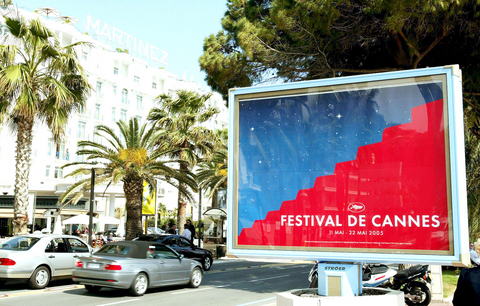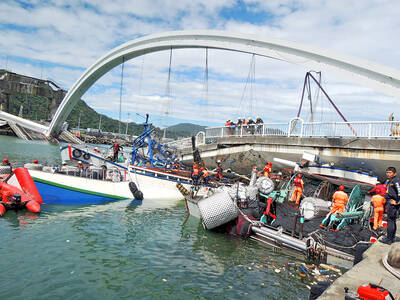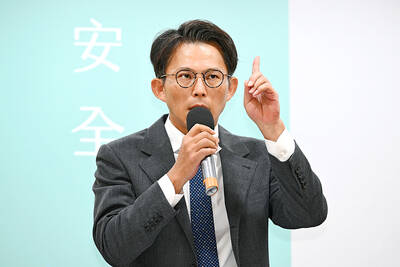The Cannes Festival is the World Series of cinema events, a blood sport where the big hitters strut their stuff and rookies might get hurt. This is a festival with attitude, a happening that excites and riles the public. Playing favorites, faithful and finicky by turn, Cannes -- and its audiences -- make and break champions.
There are directors who seem to have lifelong contracts, who are known by initials or nicknames, and those who have been dropped along the way into noncompetitive sections.
Then, in the highest out-of-competition realm, you have George Lucas's Star Wars: Revenge of the Sith, providing the Hollywood touch. The festival chiefs Gilles Jacob, Thierry Fremaux and Veronique Cayla are proud of copping this world premiere, along with Match Point, the new Woody Allen, which opens the out-of-competition screenings.

PHOTO: EPA
In this year's 58th festival, which began Wednesday and runs until May 22, the game is looking tamer, for the competition brags so many big names that you wonder where the novelty will come from.
Just look at this list: David Cronenberg, Lars Von Trier, Wim Wenders, "Gentleman" Jim Jarmusch, Gus Van Sant, "HHH" or Hou Hsiao-Hsien (
Making their competition debut this year will be Tommy Lee Jones as a director, Italy's Marco Tullio Giordano, the Larrieu brothers of France, China's Wang Xiaoshuai (
Emir Kusturica, who heads the jury, was practically born on the shores of Cannes. The director from Sarajevo first came and won the Palme d'Or with When Father Was Away on Business (1985), a comedy set in Yugoslavia. Freshly unshaved, pale, and barefoot on the beach, he spoke neither French nor English.
Since then, he made Arizona Dream with Johnny Depp, suffered his country's internal wars while being heavily criticized for not taking a stand against the Serbian leader Slobodan Milosevic, and, briefly, dropped out of filmmaking.
"I had to learn the lesson of the immigrant," he said in a 1998 interview. He also taught cinema at Columbia University, polished his language skills and leads a rock band called No Smoking.
Despite his second Palme for Underground (1995), Kusta, as he is called, is a wild card, a man who likes a good fight.
There is speculation that a jury that includes novelist Toni Morrison and filmmakers Agnes Varda and Fatih Akin will be touched by films with social and political issues, such as the Kurdish director Hiner Saleem's Kilometer Zero. But no one doubts that Kusta will have his say and leave his mark on the awards.
Dominik Moll opened the competition Wednesday evening with Lemming, a ghost story of sorts starring Charlotte Rampling, Charlotte Gainsbourg, Laurent Lucas and Andre Dussollier.
The tall, lanky, laughing Moll, who looks much too relaxed to be a French auteur, is in the hot seat: Lemming opens in France the same day, a risky business. The director made a splash in 2000 with Harry, un ami qui vous veut du bien (Harry, He's Here to Help), a dark Hitchcockian comedy that was an overnight hit -- thanks to Cannes.
A festival that flourishes on surprises and upsets, Cannes savors the rumble of impatient critics, the frenzy of press conferences, the high of last-minute entries.
Last year, it was the late arrival of Wong Kar-wai's (
Last year there was also Michael Moore with his Fahrenheit 9/11, winning over the jury's president, Quentin Tarantino, and taking the Palme, much to the dismay of the fastidious Gilles Jacob.
It was the year of the documentary, with Jonathan Nossiter's Mondovino boosted up to the competition at the last moment. Nossiter says it was like being invited to the Oscars to watch and being told he was part of the show.
"If Mondovino was shown in over 40 countries, it's mostly because of what happened at Cannes," he said.
This year, there are no documentaries, no animation surprises, no stark Iranian landscapes, no kung-fu fun. There are plenty of specials: an Atelier de Creation to help young filmmakers from all over the world, evenings on the beach called "La Soiree Movie-Mix," and an acting master class taught by Catherine Deneuve.

Before the recall election drowned out other news, CNN last month became the latest in a long line of media organs to report on abuses of migrant workers in Taiwan’s fishing fleet. After a brief flare of interest, the news media moved on. The migrant worker issues, however, did not. CNN’s stinging title, “Taiwan is held up as a bastion of liberal values. But migrant workers report abuse, injury and death in its fishing industry,” was widely quoted, including by the Fisheries Agency in its response. It obviously hurt. The Fisheries Agency was not slow to convey a classic government

Not long into Mistress Dispeller, a quietly jaw-dropping new documentary from director Elizabeth Lo, the film’s eponymous character lays out her thesis for ridding marriages of troublesome extra lovers. “When someone becomes a mistress,” she says, “it’s because they feel they don’t deserve complete love. She’s the one who needs our help the most.” Wang Zhenxi, a mistress dispeller based in north-central China’s Henan province, is one of a growing number of self-styled professionals who earn a living by intervening in people’s marriages — to “dispel” them of intruders. “I was looking for a love story set in China,” says Lo,

It was on his honeymoon in Kuala Lumpur, looking out of his hotel window at the silvery points of the world’s tallest twin skyscrapers, that Frank decided it was time to become taller. He had recently confessed to his new wife how much his height had bothered him since he was a teenager. As a man dedicated to self-improvement, Frank wanted to take action. He picked up the phone, called a clinic in Turkey that specializes in leg lengthening surgery — and made a booking. “I had a lot of second thoughts — at the end of the day, someone’s going

The next few months will be critical in determining the future of the Taiwan People’s Party (TPP). Following party founder Ko Wen-je’s (柯文哲) arrest in September last year, Huang Kuo-chang (黃國昌) effectively became the de facto face of the party and officially became chairman in January. While Ko frequently criticized the ruling Democratic Progressive Party (DPP) and insinuated sinister intentions on the part of the DPP’s New Tide faction, his era was largely defined by the TPP slogan “rational, pragmatic, scientific,” albeit defined largely by his definition of what that meant. The tone and language used by the TPP changed dramatically